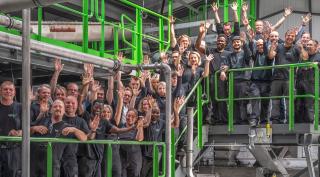
Saubermacher sets new standards in recycling
Industrial standard. The innovative process has been developed by Saubermacher and REDUX and undergoes continuous improvement. It is used to process end-of-life batteries and production rejects. Recycling is carried out in three or four steps, depending on the size of the battery – discharge[1], disassembly, thermal pretreatment and mechanical treatment. The process combines thermal treatment processes with mechanical separation for optimal results. In addition to the recycled metals, which have a quality equivalent to that of primary raw materials, active mass is also an important recycled product. Since active mass, also known as ‘black gold’, has only minimal contamination, it is ripe for low-energy recovery of nickel, cobalt, lithium and copper as part of a hydro-metallurgic process. ‘Saubermacher and our 100 per cent subsidiary REDUX in Bremerhaven have an approved and operational plant with the capability of handling up to five tonnes of lithium-ion batteries every hour,’ explains Ralf Mittermayr, Chairman of the Board at Saubermacher. ‘We are setting new industrial standards for the recycling of lithium-ion batteries, and creating an essential prerequisite for a real circular economy in the field,’ he continues. With a recycling efficiency of 95 per cent for metals, REDUX is already achieving the targets of the new EU Battery Directive, which is due to enter into effect this year (2025: 90 per cent, 2030: 95 per cent).
Alternative source of raw materials. At present, recovered secondary raw materials are actually more expensive to buy than primary raw materials. But, it is anticipated that productivity improvements will help to make treatment costs more competitive in the long term, although a number of additional factors need to be taken into account. The need for scarce raw materials continues to increase, as electric mobility clearly demonstrates. Last year, around 33,400 electric passenger cars were registered in Austria. That represents 6.4 per cent[2] of the total number, an ever increasing share. In Germany, 356,000 purely electric passenger cars were registered in 2021, which is a record for the number of new registrations.
Yet, there are no suitable raw materials deposits in Europe. More than 70 per cent of the world’s cobalt comes from the DRC, with some mining occurring under questionable conditions and with around three quarters of all mines in Chinese ownership. There are deposits of lithium in Europe, including in Austria, but mining lithium increases the salinity of freshwater bodies. ‘In addition to high dependency on relevant raw materials from abroad, increasing prices for primary raw materials are a clear red flag. That’s why it’s important to keep primary raw materials that have already entered the chain, such as cobalt, nickel and lithium, in the chain. The new EU Battery Directive must take these circumstances into account, including in respect of the Green Deal,’ emphasises REDUX Managing Director Martin Reichstein.
Zero Waste vision. Due to the flammable substances and electrical energy that they contain, lithium-ion batteries pose a particular challenge to recycling. In addition, not all lithium batteries are the same. This is especially true in electric vehicle batteries, which differ considerably in their chemical make-up. Missing product information and manufacturer-specific products also make efficient recycling harder. Nevertheless, thanks to specially trained employees and specialist expertise, Saubermacher has been able to achieve recycling rates of around 70 per cent for electric vehicle batteries, based on the entire battery.
‘Our vision is Zero Waste. On the one hand, we’re working on second-life projects and on the other, we’re continuing to improve our recycling process bit by bit with customers and partners so that eventually, we can recycle 100 per cent of all raw materials from batteries,’ explains CEO Mittermayr. The REDUX plant processes all lithium-ion batteries, i.e. domestic and device batteries as well as electric vehicle batteries, and has an approved capacity of 10,000 tonnes per year.
To achieve this vision, we need everyone’s contribution. Recycling requires batteries to be properly collected. As ever, far too many batteries end up in landfill waste or lie in drawers, basements and attics, and so their potential as a source of raw materials is lost. ‘So, with Global Recycling Day in mind, we want to emphasise the importance of separating waste correctly. Every item of waste that’s disposed of correctly helps,’ agree CEO Mittermayr and Managing Director Reichstein.
[1] There is no discharging of device and domestic batteries, such as laptop batteries, vacuum robot batteries, etc.
[2] https://de.statista.com/statistik/daten/studie/694131/umfrage/anteil-der-elektrofahrzeuge-an-den-pkw-neuzulassungen-in-oesterreich/
Press Release
Contact
For press inquiries please contact:



